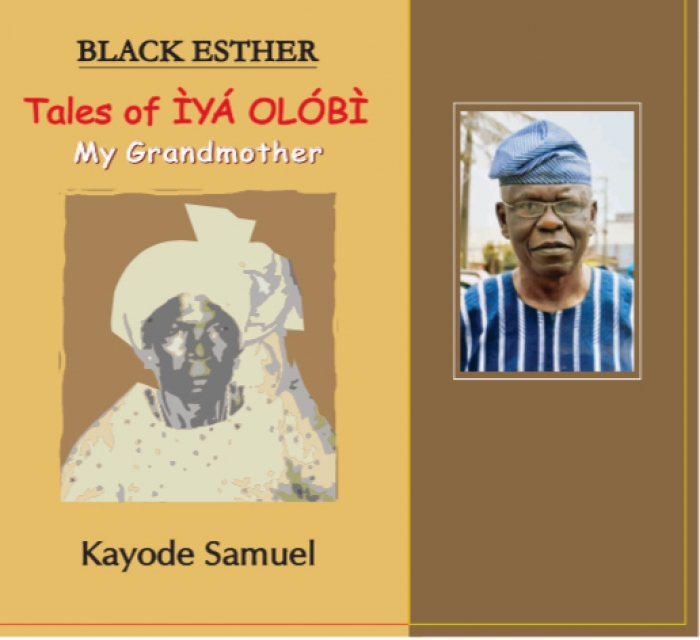By ‘Sina Kawonise
KAYODE Samuel’s Black Esther: Tales of Ìyá Olóbì is that rare book that makes you laugh out loud, nod knowingly, and then pause to sigh at the absurd beauty and contradictions of Nigeria. Ostensibly a tender, semi-autobiographical tribute to his formidable grandmother, the eponymous Ìyá Olóbì, it is also a sly excavation of Nigeria’s political and cultural DNA—from the 1960s through the 1970s and to the 2000s—rendered with humour and an eye for the telling detail.
The book opens in the Agege of old, when life was simple, yams were plentiful, kolanut was king, and the biggest distraction for a child was the delicious yoyo (fried whitebait) smuggled into schoolbags by indulgent grandmothers. This was pre-tech, pre-social media Nigeria – when communication meant face-to-face conversations, arguments meant actual voices, and news travelled at the speed of rumour. Samuel captures this era’s rhythms with a warmth that is almost tactile: you can hear the molue horns, smell the woodsmoke, and feel the camaraderie of a time when neighbours really did know your name (and your business).
But beneath the nostalgia is a sharp political undercurrent. Samuel doesn’t shy away from revisiting the ethnic suspicions that have long stalked Nigeria’s politics. His Yoruba grandmother’s open disdain for her son’s Igbo wife – voiced in passages that are both shocking and hilariously rendered – is a microcosm of the Yoruba–Igbo divide that, decades later, would echo in the 2023 presidential election, when Bola Tinubu and Peter Obi faced off and Lagos State itself became contested political ground. The book reminds us that the seeds of these tensions were sown in pre-independence political rivalry, watered by competition for resources and power, and too often exploited by politicians who thrive on division.
Samuel’s account of the 1979 elections -told from the vantage of an observant youth – captures the sophistication of the Nigerian voter, even in a time when ballot-box stuffing was not yet an Olympic sport. It’s a subtle counter-narrative to the lazy idea that the electorate is easily fooled; in reality, voters have always known how to weigh tribal loyalty, economic promises, and personal character—even if the choices were sometimes between the “bad” and the “less bad.”
Religion, in Black Esther, is less about theological purity and more about practical utility. The delightful anecdote on page 138, where faith is wielded for instrumental purposes, rings true to anyone who has seen politicians switch denominations with the ease of changing agbada. Yet, the book also honours the deep religious tolerance and eclecticism of the time—when Muslim, Christian, and traditional religions families intermarried without public scandal, and when communal harmony was an unquestioned default.
The humanity at the heart of the story glows brightest in the roadside childbirth episode (pages 143–147), where strangers, bound by nothing more than proximity and compassion, rally to bring a new life into the world. It’s a scene that makes you believe, however fleetingly, that Nigerians are better than the politicians they endure. This belief is reinforced at the funeral of Ìyá Olóbì, which draws mourners from every corner of the country—Yoruba, Igbo, Hausa, Ebira, Christian, Muslim—united in respect for a woman whose life embodied resilience, enterprise, and generosity.
Threaded through these weightier reflections are laugh-out-loud vignettes: the first-day-of-school bribery with fried fish, the spectral notoriety of Kampala Hotel, the legendary Alfa Alapanyo’paand his “detachable arm,” and Ìyá Olóbì’s selective prejudice that somehow exempted Uncle Goddy (“the only Igbo man with substance in the whole wide world!”). Samuel’s ear for Yoruba idiom and his ability to turn village gossip into comic theatre make the memoir racy and irresistible.
In one of the book’s comic peaks, the political and the risqué collide in pure Nigerian farce. It was July 1975, and General Yakubu Gowon, Nigeria’s Head of State, was in Kampala, Uganda, attending an OAU summit when a coup back home sent him into unexpected exile. News filtered into Agege—and Ìyá Olóbì, hearing the name “Kampala,” assumed it was her Kampala, the notorious brothel at the corner of Alfa Nla Street. In her mind, the Head of State had been overthrown inside that den of disrepute, perhaps caught mid-omelette with the Dan Daodus. Neighbours struggled to explain that this Kampala was a capital city in East Africa, not the egg-frying, hip-wiggling outpost two streets away. But the damage was done; the story had acquired a local seasoning that made it far more colourful than any sober BBC dispatch. In Nigeria, both brothels and State House, she seemed to think, operated on the same rule: what happens inside is “for insiders only.”
In the end, Black Esther is more than a family memoir. It is a gently mischievous but deeply affectionate portrait of a country that has always lived in the push-and-pull between unity and division, laughter and lament. It tells us that our true strength lies not in the grand speeches of politicians, but in the quiet, everyday acts of care, industry, and humour that ordinary Nigerians – like Ìyá Olóbì – practice without fuss.
The book leaves you with a bittersweet conviction: Nigeria has survived worse than today’s darkness, and it will outlive the current crop of corrupt, transactional politicians who mistake our diversity for a weakness to exploit. In reality, as Samuel’s pages remind us, it is our shared humanity – and the irrepressible Nigerian capacity to laugh at ourselves – that will keep us whole.



























